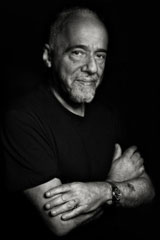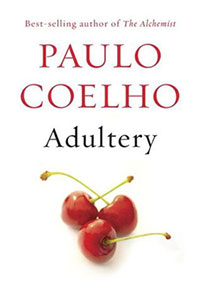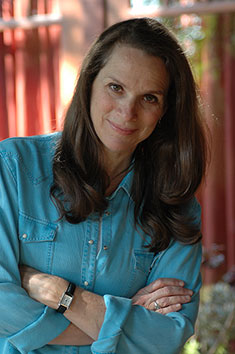 Paulo Coelho is a man of contradiction.
Paulo Coelho is a man of contradiction.
 The 67-year-old Brazilian author is an unparalleled success—known for his 1988 bestseller, The Alchemist, which is the most translated book in the world by a living author—yet he sees himself as a dreamer and a depressive. His parents committed the rebellious youth to an asylum three times, and as a lyricist whose songs were critical of his country's military rule in the 1980s, he was imprisoned and tortured. Still, he remains a joyous man, married to the same woman for 35 years and deeply grateful for "surviving the tempests" of change that have permitted him to publish one novel every two years.
The 67-year-old Brazilian author is an unparalleled success—known for his 1988 bestseller, The Alchemist, which is the most translated book in the world by a living author—yet he sees himself as a dreamer and a depressive. His parents committed the rebellious youth to an asylum three times, and as a lyricist whose songs were critical of his country's military rule in the 1980s, he was imprisoned and tortured. Still, he remains a joyous man, married to the same woman for 35 years and deeply grateful for "surviving the tempests" of change that have permitted him to publish one novel every two years.
To date, he has written 30 books, including By the River Piedra I Sat Down and Wept, The Fifth Mountain, Veronika Decides to Die, The Devil and Miss Prym, The Valkyries, The Witch of Portobello, and Brida. In his new novel, Adultery, a journalist and wife and mother in her late thirties confronts the monotony and melancholy of her perfect life when she bumps into her high school boyfriend—and soon risks everything to rediscover her true self. Goodreads author and interviewer Joy Horowitz spoke with Coelho, who splits his time between Rio de Janeiro and a country house in the Pyrenees Mountains of France, about his new book, how his astonishing 21.4 million Facebook followers and 9.4 million Twitter followers played a hand in its genesis, and why choosing to live a safe and comfortable life may be the worst thing we can ever do.
Goodreads: Condolences to your team in the World Cup.
Paulo Coelho: No, I'm really happy. I don't think they deserved to win. If they were bad, they should lose—so I'm happy.
GR: What made you nervous about writing this book?
PC: Nothing. Nothing.
GR: Really?
PC: The title. Yes, because people say, "Nobody will buy your book called Adultery and give it to his wife or husband or mother." I said, "Sorry, that's the title of the book, and it can't change."
GR: I would think it would be the opposite. I would think you'd have huge sales for a book called Adultery.
PC: [Laughs] So far the book is doing extremely well. It's number one on the bestseller list in all countries it's been released, including here in France. Then people tease me a little bit, "Oh, my wife didn't want me to read this book." It's funny, because a lot of men are reading this book.
GR: Why did you decide to make your protagonist a woman?
PC: Because it is more difficult to accept adultery in a woman than in a man. I don't know why, but people take for granted that men are unfaithful. But women in general never would do this terrible thing. So I said, OK, let's hear the woman's voice on the subject.
GR: I'm curious—why is her husband nameless?
PC: I don't know! Many times you have books with a lot of names, and you start getting confused. I don't think I gave a name to the wife of the politician. Oh, yes, yes, she has a name. I don't remember the name, but she has a name.
GR: Do you like writing sex scenes?
PC: They're not the main part of the book. But I love to write the sex scenes, because I like to write her inner moments or her moments of joy.
GR: It was interesting to me that the sex in the affair was mostly about her being degraded.
PC: Yeah. Right.
GR: Is that more of a male or female fantasy?
PC: It can be both to have this fantasy. We both have this fantasy.
GR: Do you think that depression and betrayal go hand in hand?
PC: Let me tell you how I decided to write this book. In the beginning I was thinking about discussing something that was relevant to people, because I have this huge social community on Facebook and Twitter and GooglePlus. Look at my page on Facebook and you will see. But I said, I'm so famous, so popular, why not discuss something that would be relevant? I thought that depression is the main issue of today. So I said, OK, I'm going to post something about depression, and I want you to interact with this. I'm not going to mention your name. Please send your experiences and opinions to this email. In 24 hours I got more than 1,000 answers. Out of the 1,000 answers, I heard about clinical depression. Many said, "I'm depressed because somebody betrayed me." The problem is not the lack of pharmachemical components in your body. The problem is people feel betrayed, and life loses its meaning. So I said, OK, let's talk about betrayal.
But it was overwhelming how people would answer me. And the extent of the written posts [was so great] that I thought I'd do a book. So I started going to forums—anonymously, of course—to check how people react and how people regret, one of the key issues. The first impulse is, "I'm going to get a divorce and I'm going to separate because I've been betrayed." But then they regret. A one-night stand is a one-night stand. So little by little this book started as interactive posts. Then I sat down and wrote a book based on the experiences of people.
GR: The book is really a meditation on marriage and how it's constantly in flux.
PC: I've been married for 35 years. I'm walking here in the countryside now with my wife by my side. And at the end of the day, she is a completely different person, physically and mentally, from the person I married 35 years ago. So am I. But people normally marry, and then they want that locked in time, so they think they're not going to change. We're going to change. Everybody's going to change. So accepting that changes are part of our lives makes marriage a blessing and not a curse, because love is stronger than anything else.
I just saw a rabbit. They're not very faithful, by the way. It's in a rose. (Turning to his wife) Oh, my God. Take a photo of the rose.
GR: In the book you write, "Love isn't just a feeling. It's an art. And like any art, it takes not only inspiration but also a lot of work." What do you mean?
PC: Giving space for the other to grow. Controlling jealousy that leads to nowhere. Basically, I think these issues are the key to surviving the tempests. Are you married?
GR: Yes, for 37 years.
PC: So you know what I'm talking about.
GR: One of the pivotal issues in the book is the protagonist's recognition of her being alone—whether we love to avoid dealing with our own loneliness in the world.
PC: This is a sensation I have. So probably I was projecting myself because sometimes, regardless what you do, there are moments you have these things to give, to share, but people don't understand. They say, "But you're so successful. You have a lot. You have money. You have fame." Sometimes this is not enough. Sharing is the basis of everything.
GR: The book is also about aging: "After a certain age, we put on a mask of confidence and certainty. In time, that mask gets stuck to our face and we can't remove it." Is that part of the monotony, the ritual, the boredom you write about relative to marriage?
PC: Probably the fear of monotony. You go to these parties, and everybody seems so happy. It just drives me crazy. I don't go to parties, by the way. But when I'm forced to go and everybody is smiling and happy, I know it's hypocrisy. When I go to these celebrity parties with all these actors and actresses, they're always smiling to each other, but they really want to kill the other.
GR: That jealousy is an important motivating factor in the book.
PC: Absolutely. The consequence. A one-night stand is totally different from an adulterer's relationship. People can understand or hide if you went to bed with someone else. But adultery lies in passion, and passion is something that's harder to share. You really feel you are being cheated.
GR: Goodreads member Joyce Rigal writes, "In your book your protagonist is dissatisfied even though she has everything, because she isn't living her truth. Have you experienced a moment in your life when you weren't living your truth, and how did you find the clarity and courage to live it?"
PC: The answer is yes, and it was in 1986. I had everything. I had money. I had the same wife I have now. I was a successful composer and lyricist, but I was not happy. Then I decided to walk from France to Spain—the road to Santiago de Compostela, a site of Catholic pilgrimage. At the end of this spiritual journey, I said either I forget my dream of being a writer or I write my first book (Pilgrimage), which I did. But it's not easy. You have to choose between being joyful (but not necessarily happy) and facing your challenges or trying to live a comfortable life and being safe. The second choice is the worst, because you can't feel safe. Nothing is safe. A thunderbolt could hit me and I could die. So nobody can be safe: You don't know when you're going to die. So better to choose the agony and ecstasy of living a life that fulfills you.
GR: Goodreads member Holland says, "Thank you for writing your books. They have added magic to my life. How do you think dreams serve us in life? How do you use dreams in your books and why?"
PC: Dreams are what justify life. Dreamers are people who really changed this world. I believe in dreams. I followed mine. I paid a very high price at the given moment, but I do not grieve. I think a person without dreams is a tree without roots. So dreams are the language of God. Dreams, for me, are my daily bread.
GR: Goodreads member Anthony Karakai writes, "Today's marketplace is dominated by romance and thrillers, and it appears that magical realism—outside of your novels—is not as strong as it was in the '80s and '90s. Where do you see the genre going?"
PC: It is true that we've lost this connection with magical realists because they [publishers] thought maybe this was not politically correct, that people would not read it. I'm only speaking for myself. This is the way for me to express myself. So the person who asked this question—he's totally right. Magical realism is about not having evidence for everything. And at the end of the day this is the reality. Because emotions are much more powerful than what's happening around you. You are guided by your emotions.
GR: Goodreads member Karen Reyes asks, "What inspires you to write? Do you have any tips for new young writers?"
PC: What inspires me to write is people. I spend two years meeting people, walking, wandering. And the second part, I have only one tip: Sit down and write. People want to be writers without writing. Don't care what people think. Or criticism. Or the fact that you'll be published or not. Just sit down and write. And then you're going to discover a whole universe inside yourself. You have to write because this is your dream. So write and the rest will come.
GR: What are you reading now?
PC: Right now I'm reading Michael Hastings's book The Last Magazine, about Newsweek.
GR: Tell us about your writing process. I understand you have to find a white feather before you begin writing?
PC: Yeah. When I wrote my first book, I was doubtful if I should write or do something else. I told myself, "If I find a white feather, I'll write my first book." And since that, because I only write every second year, I have a trove of ideas. And as I told you about Adultery, it was not a book. It was a post. But immediately I saw it as a good idea. At the moment I find the white feather, I have to start writing. Yes.
Then I write nonstop from the beginning to the end. For me it is very feminine. When I'm writing, I'm a woman and I'm giving birth. So you have to do it quickly. I made love, then I got pregnant, and I have to deliver the baby. Otherwise I will die and the baby will die.
I write every day. Always procrastinating in the beginning. Then I sit down and I write the first sentence of the day, and I don't eat. I drink coffee and that's it. Two weeks of pain and pressure.
GR: Two weeks of only drinking coffee? What?
PC: No. Basically I'm in a kind of a trance. I am the characters. I am the feelings. I am the city. I'm not myself anymore. I'm being an instrument that is bigger than I am.
GR: So are you a horrible person to live with?
PC: Probably. But you can stand two weeks every two years. That is not difficult. I have 100 weeks where I'm a nice person.
GR: Do you write as soon as you wake up in the morning?
PC: First I say that I'm going to write as soon as I wake up. Then I postpone and postpone and start feeling guilty and horrible and feel that I don't deserve anything. Then I say, OK, today I'm not going to write. Then I write just to not feel guilty, and I'm going to write the first sentence. Then once I'm off the ground, the plane takes off...when I'm writing, I wake up around 12 o'clock because I write until 4 in the morning. Only two weeks.
Then of course, I have to make the corrections and do another draft. I have to correct the second draft. So the first draft has, let's say, one-third more pages than the final draft. So I start cutting.
GR: What books and authors have most influenced you?
PC: There are two. One is Jorge Luis Borges. But the one who really got me was Henry Miller. When I read Tropic of Cancer, I said one day I'm going to write like him.
¤
Paulo Coelho photo by Marcos Borges (www.mborges.dk)
published in Goodreads




